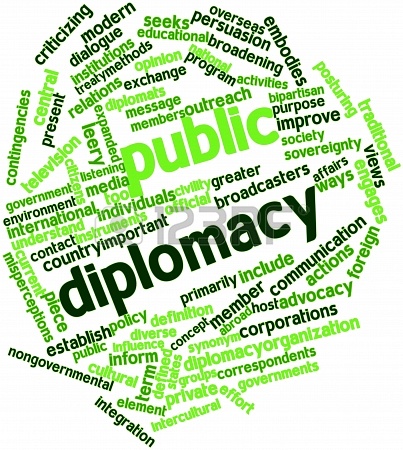diplomacyoldandnew2014a.wordpress.com
New diplomacy brings new actors to the diplomatic arena, such as non-governmental organisations (NGOs) and inter-governmental organisations (IGO).  However, the significant change in the conduct of new diplomacy considers the engagement of the government with the foreign public. Therefore, public diplomacy is the relation between government and the citizens and civil society of foreign country. Public diplomacy engages different actors in the targeted country by utilising diverse methods to reach the citizens in that country.
However, the significant change in the conduct of new diplomacy considers the engagement of the government with the foreign public. Therefore, public diplomacy is the relation between government and the citizens and civil society of foreign country. Public diplomacy engages different actors in the targeted country by utilising diverse methods to reach the citizens in that country.
 However, the significant change in the conduct of new diplomacy considers the engagement of the government with the foreign public. Therefore, public diplomacy is the relation between government and the citizens and civil society of foreign country. Public diplomacy engages different actors in the targeted country by utilising diverse methods to reach the citizens in that country.
However, the significant change in the conduct of new diplomacy considers the engagement of the government with the foreign public. Therefore, public diplomacy is the relation between government and the citizens and civil society of foreign country. Public diplomacy engages different actors in the targeted country by utilising diverse methods to reach the citizens in that country.
The significant change in the new diplomacy emerged when the state considered the importance of establishing good relations with the public and groups in other countries, with the aim of influencing the targeted state by promoting it’s culture and system of governing. For example: the U.S. is the most effective country in the world that promotes its interests through public diplomacy. According to the U.S. department of state ”the mission of American public diplomacy is to support the achievement of U.S. foreign policy goals and objectives, advance national interests, and enhance national security by informing and influencing foreign public and by expanding and strengthening the relationship between the people and Government of the United States and citizens of the rest of the world”.
The government engages with the public through various methods of communication. This includes the media and the internet, which have a major influence on individuals and groups by assessing their needs. Soft power such as information and communication technology, the media and education are frequently used by states in order to capture the hearts and minds of individuals. According to Ehiane and Mosud (2013),”the rapid development of Information and Communication Technology (ICT) has led to a drastic change in the nature and conduct of diplomacy and diplomatic services in the contemporary time”. States are more reluctant to use technology now because it provides a faster service and reaches most people in the least amount of time.
In order to understand the nation’s concerns and needs, state seeks to provide diverse resources that aim to promote cultural understanding and better education, to achieve changes through engagement with the public. Moreover, public diplomacy provides mutual understanding through the exchange of ideas between the people in different countries. This helps decision makers to conduct their policies in appropriate ways that are relevant to the country’s culture and most importantly religion. For instance, the U.S. is failing to win the hearts and minds of Muslims in the Middle East. As a result, the U.S. is gradually losing public support in the region, thus leading to the rise of extremists that threaten the interests and safety of America.
Overall, public diplomacy could not be reach foreign nations in a fast and sufficient fashion without the advancement in technology as this plays a pivotal role in globalized world. Thus, the state considers the significant impact of soft power through public diplomacy with the aim of influencing foreign governments by gaining public support. “With the increasing significant of public opinion and of civil society, with its NGOs and transnational ties, it is to be expected that public diplomacy will increase in importance, probably changing the diplomatic professions still further” (Leguey-Feilleux, 2009, p. 155).
REFERENCES:
Leguey Feilleux, R, J (2009). THE DYNAMIC OF Diplomacy. Colorado: LYNNE REINNER PUBLISHER.
Stanley, O and Mosud, Y. (2013). Information and Communication Technology (Ict) and Diplomacy: A Conceptual Overview. Available:http://www.iiste.org/Journals/index.php/IAGS/article/viewFile/9615/9725. Last accessed 25th Feb 2015.
U.S. DEPARTMENT of SATE. Under Secretary for Public Diplomacy and Public Affairs. Available: http://www.state.gov/r/. Last accessed 26th Feb 2015.
No comments:
Post a Comment